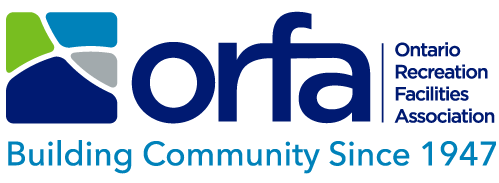- ORFA Home
- The Recreation Facility Profession
- Meet Our Members
- Rick Cox, Tillsonburg
Rick Cox
Director of Recreation, Culture & Parks, Town of Tillsonburg
Please list up to three of your most memorable career-related experiences.I vividly recall an incident when I was lifting the planks on a header trench to try and find the spot where a slow brine leak was dripping from. I could see the small bright yellow puddle in the bottom of the trench so I knew I was close. I was kneeling down, reaching forward and putting my hands on joiner after joiner when one disintegrated in my hand, splashing brine into my mouth. Yummy! What a mess. I remember working with some excellent contractors, technical experts and operations staff to design and install a complex DHW system that improved the resiliency, safety and quality of our work, while at the same time reducing utility consumption and making better use of space. It is so rewarding to be part of a team that regularly finds solutions that turn out to be greater than the sum of their parts. My most rewarding memories are of those special event days when a facility is literally bursting at the seams with people of many ages enjoying themselves doing activities of all sorts. Parking is non-existent, smiles are everywhere. All of the preparation has been done, the aftermath won't come for hours, and the staff team is in a groove making sure everything is going smoothly and safely. VIP's are shaking hands and grinning, and you know that your efforts at planning and finagling resources and motivating people to get on board have worked. Those moments are why we do what we do. What would you describe as some of the most significant workplace and/or industry challenges you have faced over the past five years?One significant challenge we have is coming to terms as employers with accommodating and handling mental health issues in the workplace. In particular, managing performance when there is an underlying (often undisclosed until afterwards) issue in a way that is appropriate, professional and effective for both the employee and the employer. Another significant challenge is that so many of the previously seemingly workable elbow grease, duct tape and baling wire problem solving techniques we used in our industry for so long are simply not viable in the current regulatory environment. However, those approaches set the cost bar so low that decision makers got used to our people accomplishing miracles for pennies, and now the funding gap we need to bridge is almost unconquerable, especially in our smaller municipalities . How has your involvement with the ORFA affected your career?ORFA has provided the reference point for professional approaches to both every day tasks and strategic issues, a thorough and well-tested training and certification regime for me and my team members, and a fabulous network of like-minded people to compare notes with who are facing the same problems I have. List any best practices or tips learned at an ORFA professional development opportunity.Get operators to use different start points to drop the conditioner for the initial circuit (SIRO). If it's not documented, it didn't happen (Legal Awareness). Know your ice plant like you know your own body - the sounds and smells it makes, where it vibrates, what it likes and doesn't like - and trust your instinct when something doesn't seem right (Basic Refrigeration). What advice would you provide to colleagues considering teaching or mentoring within the industry?I believe that every one of us should both have a mentor and be a mentor. If we are not learning all the time, and if we are not continually helping our less experienced colleagues to avoid the mistakes we made, we are more of the problem than the solution. I encourage all of us who find ourselves in a formal teaching role to practice our craft so as to reduce the spread of the all too common disease of reading PowerPoint bullet lists aloud. Final ThoughtsLive long & prosper! | In this section |
